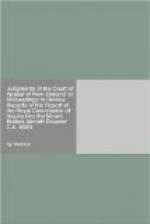It appears from the following paragraph 354 that among others interviewed by counsel or asked for comment upon this matter were Mr Chippindale (the chief inspector of air accidents), and the senior sergeant of police who had been in charge of the property collected from the crash site when it was brought to McMurdo. It is said in that paragraph that the police officer—
“... recollected either one or two flight bags among other property awaiting packing for return to New Zealand. He said that personnel from Air New Zealand had access to the store, as well as the chief inspector, and the senior sergeant said that he thought that he had given the flight bags to the chief inspector and that the chief inspector was the sole person to whom he had released any property. The chief inspector was then interviewed on 11 December 1980 by telephone, being at that time in Australia, but he said that no flight bags were ever handed to him.”
Thus the inquiries that were made in this fashion were inconclusive. However, the Commissioner was satisfied that—
“The two flight bags were lodged in the Police store at McMurdo and would have been returned in due course to Mrs Collins and Mrs Cassin by the Police. But they were taken away from the store by someone and have not since been seen.” (Paragraph 359 (1))
Then in the same context he said in sub-paragraph 359 (4):
“Captain Gemmell
had brought back some quantity of documents with
him from Antarctica,
and certain documents had been recovered from
him by First Officer
Rhodes on behalf of the chief inspector.”
And then—
“It therefore appears that there were sundry articles and perhaps documents which had been in possession of the aircrew which came back to New Zealand otherwise than in the custody of the Police or the chief inspector” (paragraph 360).
In evidence Captain Gemmell had denied knowledge of the change that had been made to the McMurdo waypoint but the Commissioner did not accept that answer; and he is linked with the matters mentioned in paragraph 360 on the basis that he had known “about the changed co-ordinates before he went to Antarctica” and that because he—
“... plainly kept this significant fact to himself, (he) was to be the arbiter of which documents were relevant. The opportunity was plainly open for Captain Gemmell to comply with the chief executive’s instructions to collect all documents relevant to this flight, wherever they might be found, and to hand them over to the airline management.”
The next sentence of that paragraph contains the finding already mentioned:




